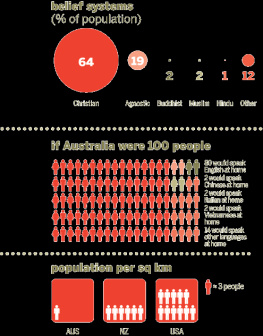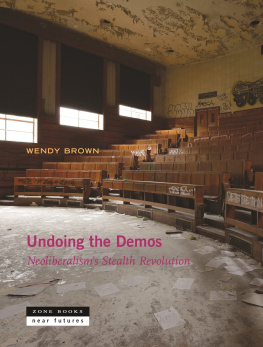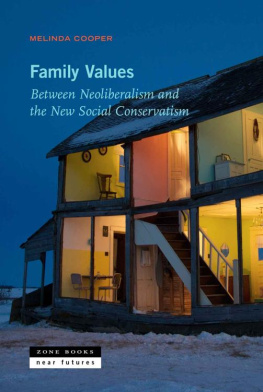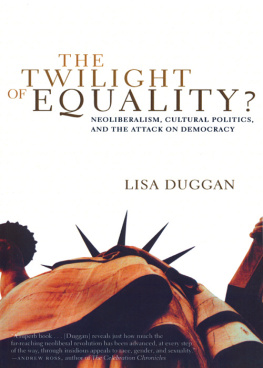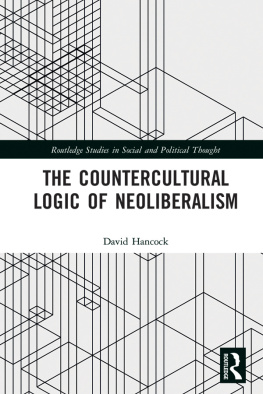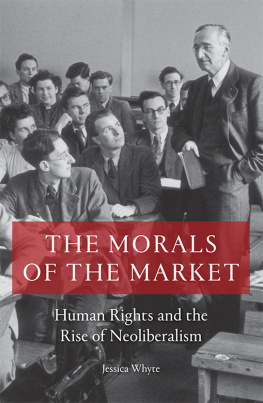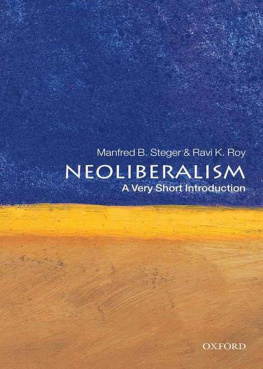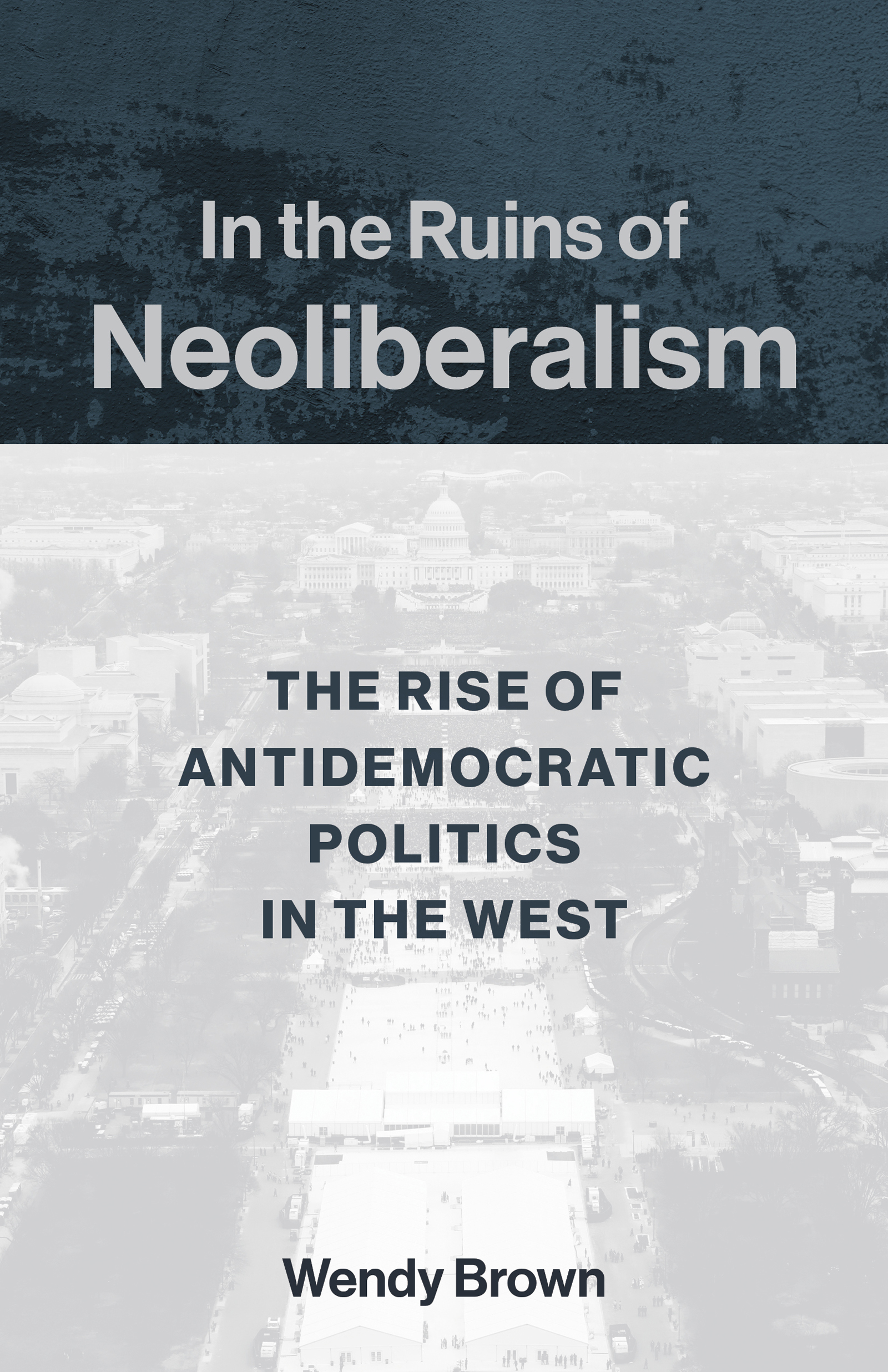Contents
Guide
Pagebreaks of the print version
In the Ruins of
Neoliberalism
WELLEK LIBRARY LECTURES

The Wellek Library Lectures in Critical Theory are given annually at the University of California, Irvine, under the auspices of UCI Critical Theory. The following lectures were given in May 2018.
UCI Critical Theory
James A. Steintrager, Director

For a complete list of titles, see .
In the Ruins of
Neoliberalism
THE RISE OF ANTIDEMOCRATIC POLITICS IN THE WEST
WENDY BROWN
Columbia University Press
New York

Columbia University Press
Publishers Since 1893
New York Chichester, West Sussex
cup.columbia.edu
Copyright 2019 Columbia University Press
All rights reserved
E-ISBN 978-0-231-55053-6
Library of Congress Cataloging-in-Publication Data
Names: Brown, Wendy, 1955 author.
Title: In the ruins of neoliberalism : the rise of antidemocratic politics in the West / Wendy Brown.
Description: New York : Columbia University Press, 2019. | Series: The Wellek Library lectures | Includes bibliographical references and index.
Identifiers: LCCN 2018060444 | ISBN 9780231193849 (cloth : alk. paper) | ISBN 9780231193856 (pbk. : alk. paper)
Subjects: LCSH: DemocracySocial aspectsWestern countries. | NeoliberalismPolitical aspectsWestern countries. | Right-wing extremistsWestern countries. | PopulismWestern countries. | Right and left (Political science)Western countries. | Political cultureWestern countries.
Classification: LCC JC423 .B83 2019 | DDC 306.209182/1dc23
LC record available at https://lccn.loc.gov/2018060444
A Columbia University Press E-book.
CUP would be pleased to hear about your reading experience with this e-book at .
Cover image : Reuters/Lucas Jackson
Contents
This book emerged from reflections following the November 2016 election in the United States. It culminated in the 2018 Ren Wellek Library Lectures at Irvine, Gauss Seminars in Criticism at Princeton, and Robert S. Stevens Lecture at Cornell Law School. I had planned other research and writing for this period, for which I received a Simon Guggenheim Fellowship and UC Presidents Humanities Research Fellowship. I turned to the questions and analyses developed in these pages because it seemed irresponsible to do otherwise. I am deeply indebted to the two fellowship programs that supported the undertaking and to the institutions that hosted the lectures.
Class of 1936 First Chair funds permitted me to employ two superb research assistants at Berkeley, William Callison and Brian Judge. In addition to their extensive help with research and manuscript preparation, both influenced my thinking with their own. William Callisons deep knowledge of the ordoliberals and subtle thinking about political rationality was especially important in conceiving and revising . He saved me from several gaffes and tutored me as we worked.
In addition to Brian and Will, Judith Butler, Michel Feher, Bonnie Honig, Steve Shiffrin, Quinn Slobodian, and Nelson Tebbe each offered excellent suggestions for improvement. The summer 2018 Lucerne Master Class permitted me to refine some of the ideas.
Wendy Lochner, at Columbia University Press, was encouraging, flexible and professional. Bud Bynack, copyeditor extraordinaire, and kind and funny as well, is a gift to writers and their readers.
Saba Mahmoods terminal illness accompanied much of the writing of this book. Helene Moglen died suddenly as I was completing it. Both were beloved friends. Both harbored irrepressible ardor for the beauty and possibilities of this world and clear-eyed fury at its cruelties, ruses, and wrongs. May their spirits animate our future.
The introduction and .
This tyrannical spirit, wanting to play bishop and banker everywhere.
George Eliot, Middlemarch
Taking even themselves by surprise, hard-right forces have surged to power in liberal democracies across the globe. Every election brings a new shock: neo-Nazis in the German parliament, neofascists in the Italian one, Brexit ushered in by tabloid-fueled xenophobia, the rise of white nationalism in Scandinavia, authoritarian regimes taking shape in Turkey and Eastern Europe, and of course, Trumpism. Racist, anti-Islamic, and anti-Semitic hatefulness and bellicosity grow in the streets and across the internet, and newly coalesced far-right groups have burst boldly into the public light after years of lurking mostly in the shadows. Politicians and political victories embolden far-right movements, which in turn acquire sophistication as political handlers and social media experts craft the message. As recruits continue to grow, centrists, mainstream neoliberals, liberals, and leftists are reeling. Outrage, moralizing, satire, and vain hopes that internal factions or scandals on the right will yield self-destruction are far more prevalent than serious strategies for challenging these forces with compelling alternatives. We even have trouble with the namingis this authoritarianism, fascism, populism, illiberal democracy, undemocratic liberalism, right-wing plutocracy? Or something else?
Failure to predict, understand, or effectively contest these developments is due partly to blinding assumptions about perduring Western values and institutions, especially progress and Enlightenment and liberal democracy, and partly to the unfamiliar agglomeration of elements in the rising Rightits curious combination of libertarianism, moralism, authoritarianism, nationalism, hatred of the state, Christian conservatism, and racism. These new forces conjoin familiar elements of neoliberalism (licensing capital, leashing labor, demonizing the social state and the political, attacking equality, promulgating freedom) with their seeming opposites (nationalism, enforcement of traditional morality, populist antielitism, and demands for state solutions to economic and social problems). They conjoin moral righteousness with nearly celebratory amoral and uncivil conduct. They endorse authority while featuring unprecedented public social disinhibition and aggression. They rage against relativism, but also against science and reason, and spurn evidence-based claims, rational argumentation, credibility, and accountability. They disdain politicians and politics while evincing a ferocious will to power and political ambition. Where are we?
There has been no shortage of efforts by pundits and scholars alike to answer this question. A composite Left account, whose limits will soon become clear, goes roughly like this: in the Global North, neoliberal economic policy devastated rural and suburban regions, emptying them of decent jobs, pensions, schools, services, and infrastructure as social spending dried up and capital chased the cheap labor and tax havens of the Global South. Meanwhile, an unprecedented cultural and religious divide was opening. Hip, educated, slender, secular, multicultural, globetrotting urbanites were building a different moral and cultural universe from the midlanders, whose economic woes were salted with steadily growing estrangement from the mores of those who ignored, ridiculed, or disdained them. More than hard up and frustrated, the Christian white rural and suburban dwellers were alienated and humiliated, left out, and left behind. Then there was enduring racism, rising as new immigrants transformed suburban neighborhoods and as policies of equity and inclusion appeared to the uneducated white male to favor everyone over him. Thus, liberal political agendas, neoliberal economic agendas, and cosmopolitan cultural agendas generated a growing experience of abandonment, betrayal, and ultimately rage on the part of the new dispossessed, the white working-class and middle-class populations of the First and Second Worlds. If their dark-skinned counterparts were hurt as much or more by neoliberal decimations of union-protected jobs and public goods, by declining opportunities and educational access and quality, what blacks and Latinos did not suffer was lost pride of place in America or the West.






